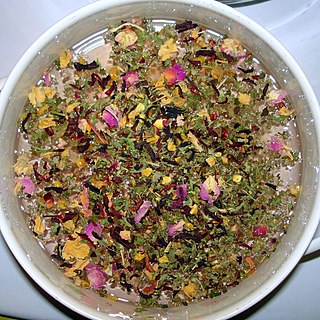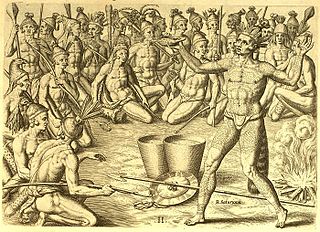
Caffeine is a central nervous system (CNS) stimulant of the methylxanthine class and is the most commonly consumed psychoactive substance globally. It is mainly used for its eugeroic, ergogenic, or nootropic (cognitive-enhancing) properties. Caffeine acts by blocking binding of adenosine at a number of adenosine receptor types, inhibiting the centrally depressant effects of adenosine and enhancing the release of acetylcholine. Caffeine has a three-dimensional structure similar to that of adenosine, which allows it to bind and block its receptors. Caffeine also increases cyclic AMP levels through nonselective inhibition of phosphodiesterase, increases calcium release from intracellular stores, and antagonizes GABA receptors, although these mechanisms typically occur at concentrations beyond usual human consumption.

Herbal teas, technically known as herbal infusions, and less commonly called tisanes, are beverages made from the infusion or decoction of herbs, spices, or other plant material in hot water. Often herb tea, or the plain term tea, is used as a reference to all sorts of herbal teas. Many herbs used in teas/tisanes are also used in herbal medicine and in folk medicine.

Guaraná is a climbing plant in the family Sapindaceae, native to the Amazon basin and especially common in Brazil. Guaraná has large leaves and clusters of flowers, and is best known for the seeds from its fruits, which are about the size of a coffee bean.

Jolt Cola was a carbonated soft drink produced by The Jolt Company, Inc.. The cola drink was created in 1985 by C. J. Rapp as a highly caffeinated beverage. It was targeted towards students and young professionals, stressing its use as a stimulant in a similar manner as energy drinks. Its slogan reads "All the sugar and twice the caffeine!"
Caffeinism is a state of intoxication caused by excessive consumption of caffeine. This intoxication covers a variety of unpleasant physical and mental symptoms associated with the consumption of excessive amounts of caffeine.

An energy drink is a type of functional beverage containing stimulant compounds, usually caffeine, which is marketed as providing mental and physical stimulation. They may or may not be carbonated and may also contain sugar, other sweeteners, or herbal extracts, among numerous other possible ingredients.

Buckfast Tonic Wine is a caffeinated alcoholic drink consisting of fortified wine with added caffeine, originally made by monks at Buckfast Abbey in Devon, England. It is now made under a licence granted by the monastery, and distributed by J. Chandler & Company in Great Britain, James E McCabe Ltd in Northern Ireland, and Richmond Marketing Ltd in Ireland. It is based on a traditional recipe from France. The wine's distributor reported record sales of £43.2 million as of March 2017.

A caffeinated drink, or caffeinated beverage, is a drink that contains caffeine, a stimulant that is legal practically all over the world. Some are naturally caffeinated while others have caffeine added as an ingredient.

A power nap or cat nap is a short sleep that terminates before deep sleep. A power nap is intended to quickly revitalize the sleeper.
The health effects of tea have been studied throughout human history. In clinical research conducted over the early 21st century, tea has been studied extensively for its potential to lower the risk of human diseases, but there is no good scientific evidence to support any therapeutic uses other than possibly increasing alertness, an effect caused by caffeine in the tea leaves.
Decaffeination is the removal of caffeine from coffee beans, cocoa, tea leaves, and other caffeine-containing materials. Decaffeinated products are commonly termed by the abbreviation decaf. Decaffeinated drinks contain typically 1–2% of the original caffeine content, but sometimes as much as 20%.

Yaupon tea refers to several kinds of caffeinated beverages originally brewed by Native Americans in the Southeastern United States and later adopted by Europeans and Americans. It is generally brewed from yaupon holly, which is native to the Atlantic and Gulf Coasts, and is related to yerba mate and guayusa. The Native drink may also have included the related dahoon holly and other herbs.

Caffeine dependence is a condition characterized by a set of criteria, including tolerance, withdrawal symptoms, persistent desire or unsuccessful efforts to control use, and continued use despite knowledge of adverse consequences attributed to caffeine. It can appear in physical dependence or psychological dependence, or both. Caffeine is one of the most common additives in many consumer products, including pills and beverages such as caffeinated alcoholic beverages, energy drinks, pain reliever medications, and colas. Caffeine is found naturally in various plants such as coffee and tea. Studies have found that 89 percent of adults in the U.S. consume on average 200 mg of caffeine daily. One area of concern that has been presented is the relationship between pregnancy and caffeine consumption. Repeated caffeine doses of 100 mg appeared to result in smaller size at birth in newborns. When looking at birth weight however, caffeine consumption did not appear to make an impact.

Caffeine is a bitter, white crystalline xanthine alkaloid that acts as a psychoactive stimulant drug. It can have both positive and negative effects on different aspects of memory.
Coffea charrieriana, also known as Charrier coffee, is a species of flowering plant from the Coffea genus. It is a caffeine-free coffee plant endemic to Cameroon in Central Africa. It is the first recorded caffeine-free Coffea in Central Africa, and the second to be recorded in Africa. The first caffeine-free species was previously discovered in Kenya, named C. pseudozanguebariae. The International Institute for Species Exploration at Arizona State University and a committee of taxonomists and scientists voted C. charrieriana as one of the top 10 species described in 2008.

A caffeinated alcoholic drink is a drink that contains both alcohol and a significant amount of caffeine. Caffeine, a stimulant, masks some of the depressant effects of alcohol. However, in 2010 and 2011, this type of drink faced criticism for posing health risks to its drinkers. In some places there is a ban on caffeinated alcoholic drinks.

The 17 November 2010 United States ban on caffeinated alcoholic drinks is a ban which prevents the marketing and distribution of any prepackaged caffeinated alcoholic drink.
Defense Soap is a company that markets and sells soap, barrier cream, equipment cleaners, sanitary wipes, and essential oils intended to address grappling specific cleanliness issues.
A caffeine patch is a type of a transdermal patch designed to deliver caffeine to the body through the skin. The concept is similar to that of a nicotine patch.

Steem was a brand of caffeinated peanut butter produced by STEEM Peanut Butter, Inc. The company was co-founded by Chris Pettazzoni, Keith Barnofski, and Andrew Brach and was based in Greenfield, Massachusetts. Sold in the United States between 2014 and 2019, the peanut butter was predominantly marketed as an alternative to coffee as a source of the stimulant caffeine. In 2015, US senator Chuck Schumer publicly criticized the high levels of caffeine in Steem, leading to the company being contacted by the Food and Drug Administration as part of a wider investigation into foods containing additional caffeine.













